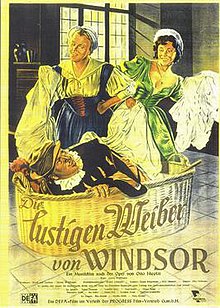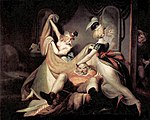The Merry Wives of Windsor (1950 film)
| The Merry Wives of Windsor | |
|---|---|
 | |
| Directed by | Georg Wildhagen |
| Written by | Otto Nicolai (opera) Salomon Hermann Mosenthal (opera) William Shakespeare (play) Georg Wildhagen Wolff von Gordon |
| Starring | Sonja Ziemann Camilla Spira Paul Esser Ina Halley |
| Cinematography | Eugen Klagemann Karl Plintzner |
| Music by | Otto Nicolai (opera) |
Production company | |
| Distributed by | Progress Film |
Release date |
|
Running time | 96 minutes |
| Country | East Germany |
| Language | German |
The Merry Wives of Windsor (German: Die lustigen Weiber von Windsor) is a 1950 East German musical comedy film directed by Georg Wildhagen. It was based on William Shakespeare's play by the same name.
Plot
[edit]In Elizabethan England, Sir John Falstaff is embroiled in attempting to have a love affair with several women, which soon turns into a humorous adventure.
Cast
[edit]- Sonja Ziemann as Mrs. Fluth
- Camilla Spira as Mrs. Gretchen Reich
- Paul Esser as Sir John Falstaff
- Ina Halley as Anna Reich
- Eckart Dux as Fenton
- Alexander Engel as Innkeeper Reich
- Claus Holm as Mr. Fluth
- Joachim Teege as Mr. Spärlich
- Gerd Frickhöffer as Dr. Cajus
- Rita Streich as Mrs. Fluth (singing voice)
- Martha Mödl as Mrs. Gretchen Reich (singing voice)
- Sonja Schöner as Anna Reich (singing voice)
- Helmut Krebs as Fenton (voice)
- Hans Kramer as Sir John Falstaff (voice)
- Willi Heyer-Kraemer as Innkeeper Reich (singing voice)
- Herbert Brauer as Mr. Fluth (singing voice)
Production
[edit]The film is an adaptation of the 1849 opera The Merry Wives of Windsor composed by Otto Nicolai with a libretto by Salomon Hermann Mosenthal which was based on William Shakespeare's play of the same title. It was made by the state-owned DEFA studio on a large budget.[1]
Reception
[edit]The film was highly successful by East German standards,[2] and drew 6,090,329 viewers to the cinemas.[3] Ernst Richter noted that while "the socially critical tone was unmistakably present in the film", it was free of "heavy-handed communist propaganda."[4] Heinz Kersten characterized it as one of the last apolitical entertainment pictures produced by DEFA before the Socialist Unity Party of Germany tightened its control on the national film industry.[5] Albert Wilkening wrote it was "a significant step forward in making movies in the GDR... Wildhagen's directing was quite skillful."[6]
References
[edit]Bibliography
[edit]- Sabine Hake, John Davidson (editors). Framing the Fifties: Cinema in a Divided Germany. Berghahn Books (2007). ISBN 978-1-84545-204-9.
- Ernst Richert. Agitation und Propaganda : das System der publizistischen Massenführung in der Sowjetzone. Institut für politische Wissenschaft (1958). OCLC 185953805.
- Heinz Kersten. Das Filmwesen in der Sowjetischen Besatzungszone Deutschlands. Bundesministerium für Gesamtdeutsche Fragen (1963). ASIN B0000BK48Q.
- Albert Wilkening. Film. VEB Bibliographisches Institut (1966). OCLC 7216389.
External links
[edit]- The Merry Wives of Windsor at IMDb
- Die lustigen Weiber von Windsor on DEFA Sternstunden.


 French
French Deutsch
Deutsch